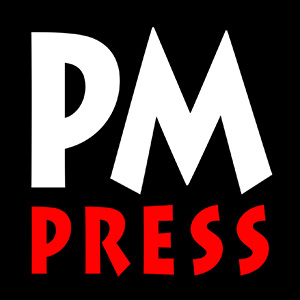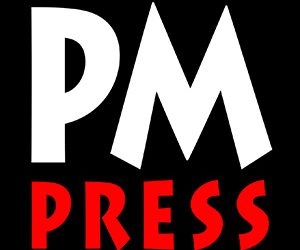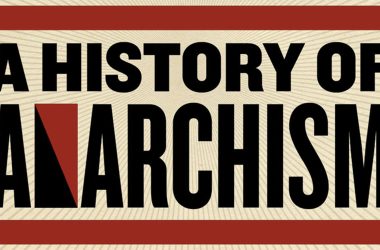By Joan Brunwasse
OpEdNews
December 29, 2009
“We’re old enough to know what we’re doing and young enough to know what’s at stake.” Welcome to OpEdNews, Ramsey. Please tell our readers a little about PM press.
Thanks for inviting/quizzing me!
The really short answer is that PM Press is a publisher (in various
formats – including print/paper, audio, video, and electronic) of fine
materials! Hopefully thought-provoking, educational, and entertaining
materials, too. We’re very new, pretty young, and still have a burning
desire to change the world. Preferably in our lifetimes!
PM
Press is, indeed, “pretty young” but those behind it have a long
history in the publishing business. Can you go back a bit and tell us
how you got involved in publishing in the first place?
I first got involved in the (often sordid) world of book selling,
publishing, and propaganda, back in the late ’70s early ’80s, in
Scotland. In 1979, at age 13, I discovered punk rock, and politics
(i.e., anarchism). Through the punk subculture, which strongly
encouraged the DIY [do-it-yourself] ethic, and practice, started
distributing punk rock fanzines, often those that interviewed the punk
rock bands for which I sang.
I was fortunate, early on, to meet
more experienced booksellers/publishers/propagandists, at a Crass
concert [legendary British anarchist punk band]. Those kind, gentle and
brilliant souls worked at a radical bookstore, called Housmans, in
London (still there, today, in Kings Cross). They were kind enough to
mentor this very annoying kid with his million and one questions in the
ways of such literature and ideas, and the production, and dissemination
of it. So, quickly, I started publishing too, under the name AK Press,
AK being my mother’s initials, and it all trundled on from there.
Ah,
a kid with a dream! How lovely! So, music actually brought you to
publishing. Before we move forward to the publishing world, let’s stop a
moment at the punk rock. You were in a band/s for how long? Are you
still active as a musician?
I wouldn’t say that
music brought me to publishing, or vice versa, really. I discovered punk
rock and politics of the anarchist bent, at the same time. And they
were inseparable to me, rather than consequential. I was partly drawn to
punk, because of the politics of the lyrics (and practice), rather than
to anarchism, because of the sung/shouted words! A veritable
chicken/egg situation, if a vegan can use such an analogy, for sure.
I played in various bands from 1980 onwards. The only band that
actually recorded (various records) and toured was one called Political
Asylum. I guess we were around for a decade, from 1982 to 1992. The
band, and our concerts/tours were certainly an early distribution method
for the literature. Four or five years ago, I joined a folk band, here
in the San Francisco Bay Area, called Folk This! We’re not the world’s
most productive musical ensemble, but we do manage to play a couple of
benefits a year, and appear on the occasional picket line to add our
voice.
You’re political on every
level – through your music, your work, and your eating! Let’s talk about
anarchy and anarchist writing for a moment. I’m a nice, suburban girl,
raising my own kids in the suburbs. I don’t really know from anarchists.
When I looked through your catalog, I just saw a lot of intriguing
titles that I wanted to peruse. Can you explain a little about what you
as an anarchist believe? It’s a concept that carries a lot of emotional
freight for us Americans. Should we be afraid of it?
Never fear. There are many nice anarchist suburban girls, raising their
kids in the suburbs too. For me, anarchism is at its core, the very
simple, common-sense notion that folks are best able to organize their
own lives,in concert with others, without the impediments of the state,
hierarchy and authority, which just tend to get in the way. It’s a form
of social, economic and political organization which stresses
‘horizontal’ forms or organization, as opposed to the typical ‘top-down’
hierarchical methods. Folks left to their own devices typically tend to
do this anyways. Indeed, insofar as society still functions, it’s
largely because of this application of what the anarchists call ‘mutual
aid’, rather than because we are coerced into doing so by fear,
law-enforcement, rules and regulations, etc.
Anarchism is also a
practice, as well as a theory. The self-emancipation of the working
class. Of course, those in authority, since it’s inception, like any
radical idea/practice, have spent the last couple of hundred years
attacking/ridiculing/distorting anarchism…but that’s only to be
expected, right?
Naturally. This
reminds me of a book I read recently. In A Paradise Built in Hell,
Rebecca Solnit writes about how communities experiencing disaster
naturally and organically build their own self-help structure. She
studied five different catastrophes through history, including 9/11 and
Katrina. And what you say is what she reported. People on the ground
reached out to one another and built whole helping networks which were
promptly dismantled, disrupted and delegitimized by the government
agencies when they eventually showed up. Is that sort of what you’re
talking about?
That is definitely an excellent example. But the very fabric of society is also based on co-operation, not competition, not just in times of crisis. How would those suburban kids ever get raised if it wasn’t for parents’ groups, and babysitting swaps, and joint kids activities. And how come you can mail a letter anywhere in the world, and it’ll arrive,more or less! Because of the Universal Postal Union, a non-hierarchical, co-operative, non-coercive federation of postal systems in the world, who all agree to deliver each other’s mail, etc. etc.
So, what
you’re saying is that “anarchy” might be a scary sounding term but it’s
actually something that we’re quite familiar with and actually
appreciate in action. You’re from the UK. You had a chance to put your
political activism into practice over there. What did you take on and
what were you all able to accomplish?
[You’re]
not only familiar with, but – typically unwittingly – [you] actually
practice it all the time! I’m very leery of the ‘activist’/’normal
person’ dichotomy. I have never seen myself as an activist as such. The
publishing and distribution, which I’ve always viewed as part my
contribution to building a better world, is just something which I have
somewhat of a knack for, even if that ‘talent’ is largely just
perseverance! And I’m all for encouraging folks to do what they feel
comfortable with, rather than criticizing and/or castigating them for
what they are not doing (whatever that may be).
Outside of the
propaganda world, I was active in various anarchist and strike/labor
solidarity groups in Scotland, culminating in the anti-poll tax
campaign. Briefly, that was a 6-year campaign against a particularly
vicious law/tax, which resulted in the biggest mass movement of
non-cooperation/breaking the law ever in British history. 50% of adults
in the UK never paid the tax/broke the law….i.e., 17 million folks!
‘Twas an honor, a thrill, and very exhausting to be a part of that!
I
see what you’re saying about the unsuitability of the activist/normal
person dichotomy. Having said that, are you still involved, beyond your
publishing and music, with what would be perceived as more political
action?
Over the years, I’ve lent my body to
picket lines, knocked on doors, marched down streets, volunteer as a
guest host and producer at KPFA radio, that sort of thing.
That all counts. Speaking about forms of community involvement, what’s your take on our new president?
He’s not my president! Despite ‘no taxation without representation,’
us foreigners still can’t vote! What surprises me about Obama is not how
reactionary/business as usual/bail out the banks/increase foreign wars,
etc. that he is, but how/why anyone thought he was in any way
progressive. I mean, it’s not like he claimed he was ever progressive,
let alone radical. He promised hope and change. Pretty much what George
Bush Jr. promised, and every other politician.
So,
same old, same old. Let’s go back to PM. Give our readers a sense of
what kinds of books you offer. Maybe some of them are thinking,
“Anarchist publishers – it’s probably all bomb-making instructions and
manifestos.”
Firstly, it’s probably fair – and
accurate! – to say that while myself and several of the folks that work
at PM and we publish are anarchists (and proud of it), the majority of
folks are not. Which is absolutely fine. The labels – and definitions –
don’t concern me so much as the practice, the work and the results! To
that end, we publish a wide variety of books (and CDs and DVDs). Fiction
and non-fiction, history and politics, art and culture, music and film.
The common thread that unites them all is that a) they’re really good
b) they’re thought-provoking, stimulating, entertaining, and educational
and c) they look really good!
I can vouch for that. Anything you’d like to add before we wrap up, Ramsey?
Thanks for the opportunity. And I would, of course, encourage folks to
check out PM Press at www.pmpress.org, and humbly suggest that the
Friends Of PM is a rather excellent way to discover a boatload of
fantastic new literature. Rock on!
Rock on, indeed! Thanks for talking with me, Ramsey. It’s been a pleasure.






